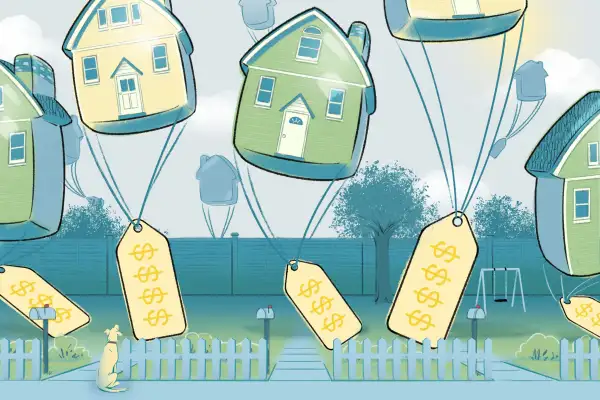‘Make Me Move’: Sellers Are Listing Their Homes at Ridiculous Prices Just to See What Happens

When Daniel Penzing’s real estate agent suggested a $345,000 price tag for his Chicago condo, he balked at the number.
“We told our realtor that we wanted to list our condo 5% above his suggested listing price,” Penzing says. “I knew the market was hot.”
Daniel and his wife Natalia followed their guts, instead listing the property for $379,000. It sold in less than a week for $375,000, a whopping $30K more than their agent’s suggestion — enough to cover his 2% commission and then some.
“The one sentence spoken to our agent pretty much paid for all his services,” says Penzing, an investor and chief editor at personal finance site Maze of our Lives.
The Penzings aren’t the only sellers feeling confident these days. According to a recent survey from listing site Realtor.com, 94% of sellers expect their homes to sell for more than they paid. A full third? They plan to list their home for more than they think it’s worth.
This isn’t too surprising given today’s home prices.
In May, the median price for a home crossed above $350,000 for the first time ever. That's up 23.6% from a year earlier — and the 111th straight month of year-over-year gains, according to the National Association of Realtors. Even for newly minted homeowners, that could mean a significant profit — and quite the temptation to sell.
Clearly, in Penzing’s case, pricing over what his agent suggested worked out, but that doesn't mean overpricing is always (or even usually) the best strategy. The pace of home sales also slowed for the fourth consecutive month in May, as buyers were priced out or decided to wait until the market cools.
"When sellers start hearing how hot the market is, they get tunnel vision,” says Phillip Salem, a Compass agent in New York City. “They think their property is the hottest one on the block."
The rise of ‘make me move’ pricing
As homeowners watch their neighbors bring in big profits, some are feeling FOMO — and listing their properties just to see who bites. As Rick Palacios, director of research at John Burns Real Estate Consulting tweeted last month, there’s “a lot of aspirational ‘make me move’ pricing happening.”
This is particularly true in the suburbs and outlying markets around big cities, which have seen an influx of buyer demand since the pandemic.
“There are a lot of homeowners in secondary and tertiary markets that never imagined their market could go up 20% to 30%-plus in a year,” Palacios now says. “I suspect homeowners there are realizing the timing makes sense to throw out a big listing price given the outsider money now flooding into their once-sleepy markets.”
Boise, Idaho, is a great example. The market has seen home prices rise 36% compared to last year. Prices in Bend, Oregon are up 32%.
Still, this approach isn’t just happening in certain locales. Thanks to swelling buyer demand and the sheer lack of homes for sale, homeowners all over are looking to take advantage.
According to title insurer First American, only 115 out of every 10,000 homes were for sale this spring — the lowest share on record and down 50% compared to last year. The tight supply has homes flying off shelves, with the average home selling 35 days faster than a year ago. Researchers say the housing market is close to 7 million homes short of what is needed to keep up with demand.
“With demand high and supply low, sellers are largely in the driver's seat when it comes to the housing market,” says Danielle Hale, chief economist at Realtor.com. “This sometimes means they're putting homes up for sale for more than they believe the home is worth.”
As Dennis Bowers, a real estate agent with The Bowers Group in Naples, Fla., puts it, “Many people are reaching for the stars, for sure. You have to talk almost every seller down from overpricing. Even if you are going to sell for a record number, the seller wants to try to get more.”
The dangers of overpricing
Agents admit that sometimes their clients’ lofty goals pay off.
Still, most of the time, this strategy isn’t successful. Take a recent listing that agent Kevin Sneddon brokered in Darien, Conn. Sneddon wanted to list the five-bedroom, five-bath, waterfront property at $12.9 million. His sellers? They wanted $14.9 million.
“I agreed to list the property at the seller's aspirational price for 30 days,” Sneddon says. “On day 30, I reduced the price to my recommended price, and within less than 30 days, we had an accepted offer.”
While reducing the price — as in this case, can help move the property eventually, agents say the damage may already be done.
This is because when a home sits on the market too long, buyers often worry something’s wrong with it. When this happens, multiple price cuts are needed to offset these concerns.
“Sellers assume they will have to negotiate anyway, so why not start high to come down to their price?” says Noah Rosenblatt, co-founder of real estate analytics company UrbanDigs. “Unfortunately, this tactic leads to longer days on-market and steeper discounts compared to pricing at-market.”
How to sell your home for top dollar — without over pricing
Often the best method is just to set a reasonable price, and let the competition take over. According to real estate brokerage Redfin, a whopping 70%-plus of buyers found themselves in a bidding war in April and May. And half of homes? They sold for above list price.
“With a market this strong — and depending on the product and price point, it is so much better to price where it is worth and let the market go from there,” says Lindsay Barton Barrett, a licensed associate real estate broker at Douglas Elliman. “You may have a much better end result.”
So, what is your home worth? That depends on a lot of factors, including your local market, as well as the demand for your style of home. You can gauge this by looking at recent sales data in your area — specifically of homes with similar features, layouts and other details. An in-tune agent can help as well.
“My biggest advice would be to hire an agent who is not going to upsell you an unrealistic price but rather provide data and figures that justify the price they’re suggesting,” Salem says. “We are on the field daily. Photos online are one thing, actually stepping foot in an apartment and seeing all the tiny details that make one sell or not sell at a certain price is another.”
How to smartly test a higher price
Not convinced?
An option for those who still want to try out a high price is a pocket listing, also known as a coming-soon listing. These essentially allow you to try to sell your home without marketing it on your local multiple listing service, Zillow or other public listing sites. Instead, your agent shops it around among agents and buyers they’re connected to — sort of like your own private buyer network.
“Nowadays, the private network is just as hot as the regular network,” says Moe Duric, an agent with Baird & Warner in Chicago. “The best thing about the private market is you can stay in there for however long you need to. It’s a great tool to test the waters or gain momentum and get the word out there that your listing will be going live soon.”
Finally, if you do go public with a lofty price tag, make sure you set a deadline for lowering it, like Sneddon did for his customers.
“If you’re serious about selling, you can try an aspirational number, but if you don't get an offer in the first two weeks, you need to drop the price,” Bowers says. “It’s OK to try it for a short period of time, but homes that sit on the market for any extended amount of time right now have a red flag on them that something is wrong.”
More from Money:
Lightning-Fast Home Sales Are Leaving Sellers Stranded
Half of Homes Are Selling for Over Asking Price
'FOMO Took Over.' Some Buyers Who Caved to a Hot Housing Market Now Regret It
